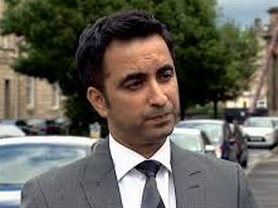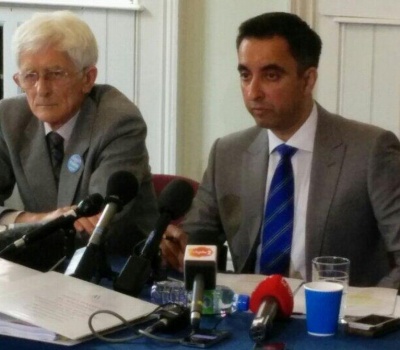Aamer Anwar


Aamer Anwar (born 1967) is a Scottish lawyer of Pakistani background who is considered one of Scotland's top lawyers, campaigning for over 25 years for justice and equality. Anwar has been at the forefront of the 'Stop the War Coalition', led the campaign against the 31st G8 summit at Gleneagles in 2005 and has campaigned for closure of Dungavel Detention Centre for failed asylum seekers.[1]
Aamer Anwar is active on Twitter (@AamerAnwar), and is a prolific writer and newspaper columnist whose latest article "Special relationship with the US - Do we really want it?" appeared in the Scottish Sun on 8 June 2014.[2]
On 5 June 2014, the BBC reported that Aamer Anwar - acting for six of Abdelbaset al-Megrahi's relatives and for 24 British Lockerbie relatives, including John Mosey and Dr Jim Swire - had lodged a new application with the SCCRC for Megrahi's Lockerbie bombing conviction to be reviewed. Anwar said:
- "To date both the British government and Scottish government have claimed that they played no role in pressuring Mr Megrahi into dropping his appeal as a condition of his immediate release. However the evidence submitted to the Commission today claims that this is fundamentally untrue."
Anwar added:
- "The fundamental question for the Commission is whether it regards it as in the interests of justice to refer a case back to the High Court where the convicted person himself had commenced an appeal on a SCCRC reference and then chosen to abandon it? The answer might depend on the precise circumstances in which the appellant came to abandon his appeal. Mr Megrahi's terminal illness; the fact that prisoner transfer was not open while the appeal was ongoing; and whether Mr Megrahi had no way of knowing that Kenny MacAskill would ultimately opt for compassionate release rather than prisoner transfer or, as is alleged, that he was led to believe that he would not be released unless he dropped his appeal."[3]
Aamer Anwar has also asked the SCCRC to consider further evidence, including claims that it was impossible for the MEBO bomb timer identified by prosecutors at Megrahi's trial to have been responsible for the bombing; and that there is evidence the bomb - which the court heard had been put onto a flight at Malta - had already been ingested at Heathrow, the doomed flight's departure airport.[4][5]
Biography
Born in England, Aamer Anwar moved to Scotland in 1986 to study mechanical engineering at the University of Glasgow for a future in the Royal Air Force. He became a student activist and led a campaign for black students at the city's Dental Hospital.
He left engineering to do sociology and politics. He was still a student when, in 1991, he was chased by police officers, after being caught flyposting on Ashton Lane, and beaten up, losing his front teeth being hospitalised. Later, he made legal history by taking the officers responsible to court and receiving £4,500 damages from Strathclyde Police for the assault in which they are alleged to have made the racist comment "this is what happens to black boys with big mouths".
He graduated with an MA in Social Sciences in 2004, and from the University of Liverpool in 1996 with a postgraduate diploma in race law, and an LLB from the University of Strathclyde in 1999 and a Diploma in Legal Practice in 2000. In 2008 he was number 9 in the independent law magazine The Firm's Power 100 list.
He was the Scottish organiser for the Anti-Nazi League and led a march in 1993 to the London headquarters of the British National Party. He also worked for the Commission for Racial Equality, before deciding, in 1997, to go to law school as a mature student.
Anwar became a solicitor in 2000 and became part of a Glasgow-based partnership, before branching out on his own in 2006 and setting up Aamer Anwar & Co, Solicitors & Notaries. Several nominations for "Criminal Lawyer of the Year" by The Law Awards of Scotland have resulted in Anwar winning in both 2005 and 2006.
Aamer Anwar received a record 13,500 nominations in the short list for the Lloyds TSB Jewel Awards and was awarded the Professional Excellence Award as a "recognition of his outstanding achievements and the huge impact his work has had UK wide."
In 2013 he was a finalist for the Services to Law at the British Muslim Awards sponsored by Accounts Management Services along with Stephen Lawrence Family lawyer Imran Khan. The winner was chief prosecutor Nazir Afzal (CCPS)
In 2014 he was awarded the Scottish Muslim Award—Al Adl Ihsan for Public Services (Adl and Ihsan are Arabic terms for evoking the importance of justice and charity in Islam). He was given the award by Baroness Syeda Warsi on 11 May 2014 who described herself as being a "fan".
Legal career
He has often represented clients in high profile controversial criminal cases with political or human rights implications. He is best known for his campaigns for justice after the killing of Surjit Singh Chhokar and of Glasgow schoolboy Imran Khan.
Anwar campaigned on behalf of the family of murdered Indian waiter Surjit Singh Chhokar, which became known as the Scottish Stephen Lawrence case and which led to a radical overhaul of the criminal justice system and several inquiries. In the latter case, Anwar led the justice campaign on behalf of the Chhokar family. He also served on the Justice Minister's Stephen Lawrence Steering Group.
In 2012 following the reform of the double jeopardy law he approached the Lord Advocate on behalf of the Chhokar family to request that the case be reopened and reinvestigated. On 2 May 2014, Aamer Anwar and the Chhokar family met with the Lord Advocate who confirmed that following reinvestigation by Police Scotland the Crown was seeking to have the original acquittals of three men set aside in an application to the Appeal Court for a retrial over the murder of Surjit Singh Chhokar.[6]
In 2004 Aamer was the solicitor in the successful Ice Cream Wars appeal, which saw his client 'TC' Campbell cleared after 20 years.
He is noted for his controversial remarks in the aftermath of the 2007 Glasgow International Airport attack, in which he claimed that "That there is no difference between a stealth bomber and a suicide bomber, the effects are still the same", and also that notions of multiculturalism had failed in Scotland as elsewhere in the UK due to widespread rejection of elements of British popular culture, specifically "binge drinking and Big Brother", amongst young people within the Muslim community.[7]
In 2008 he faced allegations of contempt of court in the light of a complaint by the presiding judge in the case, Lord Carloway, because of his disparaging remarks about the jury after the trial and conviction of Mohammed Siddique in the High Court of Justiciary. He was found not guilty of contempt, but Lord Osborne said the statements from the lawyer "embody angry and petulant criticism of the outcome of the trial process and a range of political comments concerning the position of Muslims in our society".
He was the first lawyer in the UK to be put on trial for contempt of court for comments he made on behalf of his client at the end of a trial. In July 2008 he was acquitted, having a legal team led by the late Paul McBride QC, as well as legal submissions in his support from Michael Mansfield QC, Helena Kennedy QC. He was supported by the trade unions and civil liberty organisations, including Liberty, who also backed his case in the High Court. There was widespread condemnation of what was perceived to be an attack on free speech and the rights of a campaigning lawyer.
The late author Iain Banks in support of Anwar in 2007 stated:
- "Aamer Anwar is a symbol of freedom. There is a need to speak out when the right to dissent and the right to speak the truths that need to be spoken are under threat. I’d urge anyone who believes in fairness and simple human decency to support him. The Scottish judicial system has enough to be ashamed of after the Lockerbie trial; let there be no more injustice in its name."
He was cleared of any wrongdoing by the Law Society. He was ultimately vindicated following the successful appeal of Mohammed Atif Siddique in February 2010, which led to his release and the quashing of his conviction under Section 58 – Collection of information of the Terrorism Act 2000, which was described as a miscarriage of justice by the appeal court.
In 2008 he was runner-up in the election for Rector of the University of Glasgow, losing the race for the position to Charles Kennedy.[8]
In 2010 he acted as solicitor for Tommy Sheridan in HM Advocate v Sheridan and Sheridan. After Sheridan sacked his advocate he was retained as amicus curiae.
On 31 January 2011 a complaint was made by Anwar, following confirmation from Vodafone that there had been attempts to access his voicemail prior to the start of the Sheridan trial.[9]
In July 2011 Anwar presented a dossier along with Tom Watson MP to Strathclyde Police into alleged criminality at the News of the World, allegations of phone hacking, data breaches and corruption in the Police. This led to full scale police inquiry by Strathclyde Police termed "Operation Rubicon" and the subsequent arrest of Andrew Coulson and Bob Bird Scottish Editor of News of the World.[10]
In April 2013, it was announced that Anwar would represent National Collective in possible legal action put forward by the representatives of oil company Vitol. Vitol's representatives threatened legal action against National Collective, a political organisation supporting Scottish independence, for being "grossly defamatory" after linking Ian Taylor, their CEO and a major "Better Together" donor, to questionable deals in Iran, Iraq, Syria, and Serbia. The organisation stated that they "will not be bullied or silenced" and that their website is "offline only as a temporary measure for a few days".[11][12]
On 2 October 2012 he gave evidence to the Scottish Parliament's Justice Committee arguing against allowing cameras into criminal trials.
References
- ↑ "Scotland’s Premier Law Firm"
- ↑ "Special relationship with the US - Do we really want it?"
- ↑ "Lockerbie bombing: Megrahi family join fight for a new appeal"
- ↑ "Megrahi - application for appeal lodged today"
- ↑ "We need the truth" - Jim Swire
- ↑ http://www.bbc.co.uk/news/uk-scotland-glasgow-west-27254141
- ↑
{{URL|example.com|optional display text}} - ↑ "Rectorial Election result".Page Module:Citation/CS1/styles.css must have content model "Sanitized CSS" for TemplateStyles (current model is "Scribunto").
- ↑ http://www.heraldscotland.com/mobile/news/home-news/sheridan-solicitor-newspaper-hacked-my-phone-messages-1.1082613 The Herald 31 January 2011
- ↑ http://www.independent.co.uk/news/uk/crime/more-than-120-police-investigate-murdoch-empires-operations-2344108.html Independent report
- ↑
{{URL|example.com|optional display text}} - ↑ "National Collective". Facebook. Retrieved 10 April 2013.Page Module:Citation/CS1/styles.css must have content model "Sanitized CSS" for TemplateStyles (current model is "Scribunto").
External links
- Aamer Anwar and Company Homepage
- Chhokar Family Liaison Arrangements Report
- Note by Lord Carloway concerning possible contempt
- Open Letter in his Defence
- BBC report
- article on his case in Sunday Herald
- Anwar judgement welcomed
- "Terrorism" conviction quashed
Wikipedia is not affiliated with Wikispooks. Original page source here